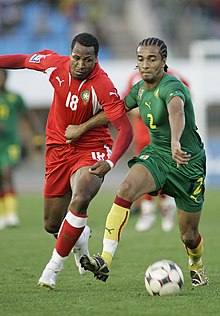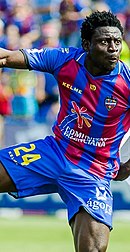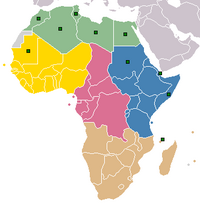Introduction
Football is the most popular sport in Africa, alongside basketball. Indeed, football is probably the most popular sport in every African country, although rugby and cricket are also very popular in South Africa. The first football stadium to be built in Africa was the Alexandria Stadium in 1929.
The English Premier League is the most popular sports league in Africa. The most popular clubs in Africa are Arsenal, Chelsea and Manchester United. (Full article...)
This section may be unbalanced toward certain viewpoints. (October 2022) |

Selected article -
The Libya national football team (Arabic: منتخب لِيْبيَا لِكُرَّةُ الْقَدَم) represents Libya in men's international association football and it is controlled by the Libyan Football Federation. The team has never qualified for FIFA World Cup but has qualified for editions of the Africa Cup of Nations in 1982, 2006, and 2012. In 1982, the team was both the host and runner-up. In the Arab Cup, Libya finished second in 1964 and 2012, and third in 1966. The team is affiliated with both FIFA and Confederation of African Football (CAF).
Due to political circumstances, Libya has typically been less successful in international competition compared to other North African teams like Algeria, Morocco, Egypt and Tunisia. Libya has never qualified for the FIFA World Cup and its participation in AFCON is sporadic, having only qualified for three AFCON editions.
Since the 2010s, Libya's global ranking has improved due to the increasing number of Libyan players playing in foreign leagues. In the 2012 Africa Cup of Nations, the team recorded their first-ever win in the tournament outside Libya. Their FIFA world ranking rose to a high of 36 in September 2012; Libya then won a gold medal in the 2014 African Nations Championship. However, the Libyan Civil War caused the stoppage of the Libyan Premier League and severely disrupted domestic affairs. Libya was eliminated in the first round of the 2015 Africa Cup of Nations qualification by Rwanda and failed to qualify for the 2016 African Nations Championship as the defending champions.
Selected biography -
After leaving Nigeria for Italy at age 16, he has since played for a number of top-division clubs around Europe. He began his senior career in 2002 at the Italian Serie A club Inter Milan, before moving to the English Premier League club Newcastle in 2006, and then the German Bundesliga club Wolfsburg in 2009. Having joined Russian Premier League side Rubin Kazan in July 2010, they loaned him to Birmingham City in January 2011. In 2012, he moved to Spain to play for Levante, spending seven months at the club before joining Seattle Sounders FC in Major League Soccer.
In club football, Martins has won the Italian Serie A title, the Italian Cup (twice), and the Super Cup, all with Inter. With Birmingham he scored the winning goal in the 2011 Football League Cup Final. He has played European football with Inter, Newcastle and Wolfsburg, winning the UEFA Intertoto Cup with Newcastle. His highest scoring league seasons so far have seen him score 11 goals in the 2004–05 Serie A, and 17 2006–07 English Premier League. In international football, Martins has been in the Nigerian squad for the Africa Cup of Nations in 2006, 2008 and 2010, and for the FIFA World Cup in 2010.
Selected image -
 |
Boys playing street football in Egypt
Subcategories
Related portals
More sports portals
WikiProjects
Related task forces and sub-projects
African football task force
WikiProject Africa • WikiProject Football
WikiProject Football task forces and sub-projects
 | |
| Wikipedia ads | file info – #250 |
Topics
Open tasks

- Expand stubs: Competitions in Africa • Organizations
- Expand club articles of teams from Africa.
- Expand biographies of Africans involved in football.
- Create: Requested articles • Most wanted football articles • Requested general football articles
- Add: Infoboxes • Images (General requests, Requested images of people)
- Review: articles currently under review
- Assess: Assessment requests • Assess an article
- Revert vandalism on this portal and on African football articles
- Assist in maintaining this portal and keeping its selected content up to date.
- WikiNews: Create and submit news stories about African football for Wikipedia's sister project WikiNews.
Associated Wikimedia
The following Wikimedia Foundation sister projects provide more on this subject:
-
Commons
Free media repository -
Wikibooks
Free textbooks and manuals -
Wikidata
Free knowledge base -
Wikinews
Free-content news -
Wikiquote
Collection of quotations -
Wikisource
Free-content library -
Wikiversity
Free learning tools -
Wiktionary
Dictionary and thesaurus
More portals
Sources

- ^ "The History Of Soccer In Africa". NPR.org. 2010-06-09. Retrieved 2016-03-31.
- ^ a b c Alegi, Peter (2010). African Soccerscapes. Ohio University Press. pp. 1–2. ISBN 9780896802780.
- ^ Frimpong, Enoch Darfah. "Ghana news: A world of superstition, frustration and disillusionment - Graphic Online". Retrieved 23 September 2017.
- ^ Lacey, Marc (8 August 2002). "Kangemi Journal; For Spellbinding Soccer, the Juju Man's on the Ball". The New York Times. NY Times. Retrieved 2016-03-31.
- ^ "World Cup Witchcraft: Africa Teams Turn to Magic for Aid". National Geographic. Archived from the original on July 10, 2006. Retrieved 2016-03-31.
- ^ Andy Mitten (September 2010). The Rough Guide to Cult Football. Rough Guides UK. ISBN 9781405387965. Retrieved 2016-04-02.
- ^ "African Nations Cup overshadowed by hocus pocus | Football". The Guardian. Retrieved 2016-04-09.
- ^ Kuper, Simon (2006). Soccer Against the Enemy: How the World's Most Popular Sport Starts and Stops Wars, Fuels Revolutions, and Keeps Dictators in Power. Nation Books. p. 123. ISBN 978-1-56025-878-0.
























